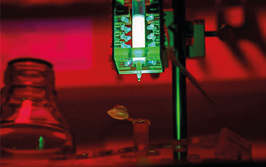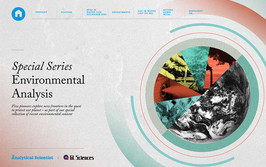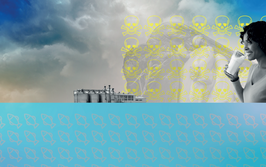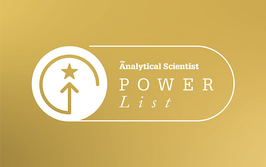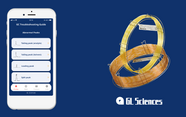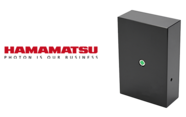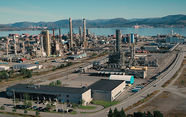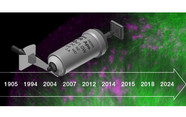For the Love of Spectroscopy
Sitting Down With Nicoló Omenetto, Research Professor in the Department of Chemistry at the University of Florida, USA.
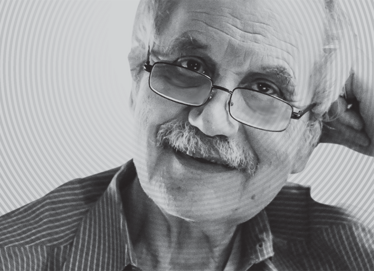
You were recently honored in a special issue of Spectrochimica Acta Part B...
It was an absolute surprise. And that’s really quite amazing; as editor, I should have suspected something! I didn’t even realize that we’d skipped from volume 99 to 101... You know, I love working in my field, but it’s really rewarding to get such a boost in credibility from colleagues (not to mention the emotional pleasure of receiving a ‘happy birthday’ from my son Fiorenzo) and the wider community – that makes me love it even more. It’s recognition that I did it right and that I should keep going.
How did you get into atomic spectroscopy?
I fell in love with atomic spectroscopy when I was a chemistry student. I remember an exam where electrons were flipping up and down. I had to put the correct angular momentum to derive the spectroscopic term. I was able to do it easily and that was that; I knew that I wanted to do spectroscopy. I also realized that I only wanted to go down the academic path of research and teaching. And that’s what I did.
How do you split your time between research and teaching?
When I was 30 years old, I felt that I couldn’t spend too much time teaching because I needed to do research – I was too busy publishing papers and writing proposals. Now, I feel that teaching is absolutely essential. If you teach and are able to get students to understand, it is the only way to approach research and to solve analytical problems. Only then are you fulfilling your role. If you can see the eyes of your students sparkling with interest, you are winning.
Who inspires you?
I would love to try and give credit to everyone who has had an impact – but the list would be too long. It includes collaborators, colleagues – and students. However, one great spectroscopist who always comes to mind is Kees Alkemade, who I had the pleasure of knowing well. He had an incredible intuition for explaining the intricacies of spectroscopy and for making statements that had a great number of scientists thinking, “I wish I’d said that...” One of Kees’ favorite topics was noise, a fascination he shared with James Winefordner, who is another spectroscopist I deeply admire. James and I have been working together for over 45 years, which has been an incredible experience for me. I’ve learned a lot from his ‘indefatigable search for knowledge’ not only scientifically but also about life more generally. Gary Hieftje is another scientist who is constantly engaged in the development of new ideas and experiments. We must always try to “look around the corner” as Kees often said – for me, that means: if you have a crazy idea, try it.
Could you elaborate?
Well, you can only discover whether an idea is worth pursuing if you get the chance to test it. I can define much of my work over the years as Toccata and Fugue (by Johann Sebastian Bach). Why? Because in Italian, it’s called ‘Toccata e Fuga’, which translates as ‘touch and go’ – in other words, try an idea and get to the next one! I can give you a very long list of projects that I tried purely out of curiosity. I admit that such an approach is slightly detrimental to being an analytical spectroscopist or an analytical chemist (and funding) – but I’ll openly confess that I never really paid much attention to whether or not there was a practical application. It was just the fun of discovery – but through it, I learnt much about the fundamentals of my field.
What’s the most exciting advance of the last 50 years?
That’s a very tough question to answer, especially if I consider spectroscopy in general and include the life sciences and molecular spectroscopy. Specifically for atomic spectroscopy, I would say that laser manipulation of atoms and molecules is the most fascinating advance – but there have been many others. I would suggest laser induced breakdown spectroscopy (LIBS) as one of the ‘old’ analytical methodologies that has been most successfully revisited in recent years. From the ChemCam on Mars to deep ocean studies, what we can learn on both a technical and fundamental level is unbelievable.
What advice would you give to aspiring academics?
First, don’t do research if you’re not having fun with it. If you’re not enjoying your work, then innovation is highly unlikely. Second, be absolutely scrupulous in the data that you present. And third, read the literature; to formulate a novel approach, you must first learn what has been done in the past.
But you’re also a big believer in scientific freedom...
Yes. And I have been extremely lucky to be protected from administration for most of my career. In fact, I spent all my time hiding in the lab until very recently, when I moved to the University of Florida. I was lucky enough to receive funding for “exploratory” research. And really, such freedom is the best scenario from an experimental point of view. Going back to the honorary issue, it proves to me (and others) that I used my freedom wisely.
I must also give credit to my wife, who has always let me believe that my work was important. You might say that she supports me, but perhaps it’s more like she puts up with me... or that she is able to forgive me! That’s a different kind of freedom.
